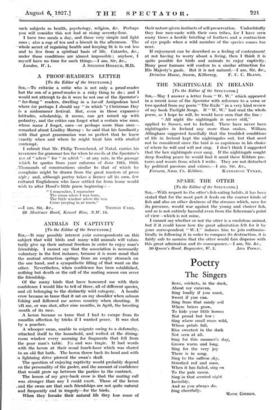ANIMALS IN CAPTIVITY [To the Editor- of the SPECTATOR.] SIR,—It
may possibly interest your correspondents on this subject that wild birds and many wild animals will volun- tarily give up their natural freedom in order to enjoy man's friendship. I cannot say that the association is necessarily
voluntary in the first instance, because it is more usual that the mutual attraction springs from an empty stomach on the one hand, and a sympathetic filling of that want on the other. Nevertheles, when Confidence has been established, nothing but death or the call of the mating season can sever the friendship.
Of the many birds that have honoured me with their confidence I would like to tell of three, all of different species, and oil belonging to the distinctly wild category. A hoodie crow became so tame that it sat on my shoulder when salmon fishing and followed me across country when shooting. It left me, or was shot, after nine months, in April, the breeding month of its race.
A heron became so tame that I had to escape from its maudlin affection by tricks if I wanted peace. It was shot by a poacher.
A whooper swan, unable to migrate owing to a deformity, attached itself to the household, and waited at the dining. room window every morning for fragments that fell from the poor man's table. Its end was tragic. It had words with the heron at their usual lunch-hour which was shared in an old flat bath. The heron threw back its head and with .0a lightning drive pierced the swan's skull.
The question of enjoying captivity would probably depend on the personality of the gaoler, and the amount of confidence that would grow up between the parties to the contract.
The lesson of my grey-back crow is that the mating call was stronger ;than any I could exert.. Those of the heron and the swan are that such friendships. are not quite natural and frequently end in tragedy—for the birds. .
When they forsake their natural life they lose some of their nature-given instincts of self-preservation. Undoubtedly they lose race-caste with their own tribes, for I have seen many times a hostile bristling of feathers and a contraction of eye pupils when a wild member of the species comes too near.
If enjoyment can be described as a feeling of contentment at not having to worry about a living, then I think it is quite possible for birds and animals to enjoy captivity, Many poor humans will confess to a similar attraction foi His Majesty's gaols. But it is not natural.—I am, Sir, &c.,






































 Previous page
Previous page